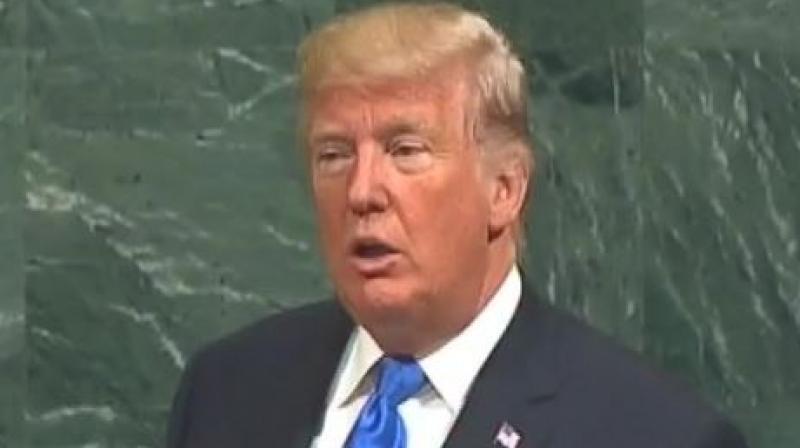Recalibrate Pak policy, reach out to the world
The Indian government has to think through its insistence on a Comprehensive Convention on International Terrorism.

World leaders make the annual pilgrimage to New York to address the high-level segment of the new session of UN General Assembly in September, which poet Alfred Tennyson presciently called in the 19th century “the Parliament of Man”. Over the years the rostrum has seen theatre, fireworks and sometimes genuine vision. US President Donald Trump with his trademark barbs, calling Kim Jung-un, the overgrown adolescent leader of the Democratic People’s Republic of Korea (as North Korea is officially known), the “Rocket Man”, or levelling extremely tendentious charges against Iran would fall into the category of bizarre theatre than statesmanship. In 2006 Venezuelan leader Hugo Chavez, speaking soon after President George W. Bush, stood at the rostrum saying the smell of “Diablo”, or the devil, still lingered. Then there was the year Soviet leader Nikita Khrushchev took off his shoe to stomp the lectern with it.
In reality, the main action is on the first two and a half days as the heads of state, who get precedence and speak first, are followed by the heads of government. By the time the foreign ministers get the stage the hall is generally half-empty or occupied by junior diplomats taking notes, except for ministers who are listed to speak. Thus, often the UNGA podium is used for domestic audiences hanging onto each nuance and phrase. This has become an art form with the BJP as the lectures are delivered in Hindi, which in translation for the international community loses much of its oratorical flourish. Sushma Swaraj’s address must be seen in that context.
Prime Minister Narendra Modi was prompt to tweet his acclamation. The speech was well constructed and began by listing global challenges like violence and terrorism, climate change, freedom of navigation on the seas, poverty, nuclear proliferation, cyber security, etc. She then shrewdly linked the UN’s goals of sustainable development, targeted to be achieved by 2030, to Narendra Modi government’s development schemes. Ms Swaraj picked up three — the Jan Dhan Yojana, or financial inclusion of 300 million people; Mudra Yojana, or funding the unfunded, particularly women; and Ujvala Yojana, or providing free cooking gas cylinders to eliminate smoke inhalation and eye injuries. She, of course, then cleverly slipped in demonetisation, on which a crescendo of expert opinion is negative, and GST, the implementation of which is as yet of questionable efficiency.
Her address then turned to Pakistan. Everyone was waiting to see how India would respond to the extremely provocative speech of Pakistan’s new Prime Minister Shahid Khaqan Abbasi. Ms Swaraj put her finger on the problem by saying while India fights poverty, Pakistan fights India. Thereafter, she was more addressing the audience back home than across the world. There is not a note she missed that would not bring cheer to any BJP election rally in India. It was in keeping with the new rallying of opinion on issues like Rohingyas to get the BJP base behind the leadership that is concerned about the increasingly negative economic news.
Contrariwise, Iranian President Hassan Rouhani made a choice, when reacting to President Trump’s diatribe calling the Iranian regime a “corrupt dictatorship”, to not succumb to conservative opinion at home urging him to reply in kind. He characterised Mr Trump’s speech as “ignorant, absurd and hateful rhetoric”. Then he added that in the portals of UN such language must not be used. He confidently asserted that Iran was confident in “the depth of our culture, the truth of our faith and the longevity of our revolution”.
This was a leader speaking to a global audience, despite extreme provocation and pressure from conservatives at home. The Indian government also has to think through its insistence on a Comprehensive Convention on International Terrorism, which India has been pushing since 1996. The whole approach to dealing with terror changed in 2001 when following the 9/11 attacks the UN Security Council adopted a number of Chapter VII resolutions on curbing terrorism, its financing and abetment. These are binding directly on all members of the UN and still have elicited partial compliance by countries like Pakistan. What is it that a new convention will do, which will be without an enforcement mechanism? Thus the Indian strategy must evolve with changing times, instead of carrying around a proposal that is anachronistic.
India also needs a new Pakistan policy which is calibrated to isolate those elements that are inimical to India instead of painting the whole of Pakistan with one brush. Moreover, the international community is little interested in India-Pakistan bickering and switches off when exchanges become rhetorical. Ashley Tellis, a profound US thinker on South Asia, in a recent piece has even advised Western analysts to not keep pushing for dialogue between India and Pakistan as no peace process will work unless the Pakistani Army overcomes its India phobia and its desire for equivalence and revenge for the 1971 defeat. To help people like
Mr Tellis develop this further, India must not succumb to trading charges with electrifying statements like the coinage “Terroristan”, which play well on television and the social media, but reduce India to the level of Pakistan.
Teddy Roosevelt voiced the best prescription for a rising power like India facing a troublesome neighbour to the west, using terror asymmetrically, in league with another powerful foe to the north. He suggested “speaking in a soft voice and carrying a big stick”. The BJP leadership obviously does not think that is useful domestically. The people of India, however, will have to decide in a little over a year if Trump or Roosevelt should be the preferred guide on diplomacy.
